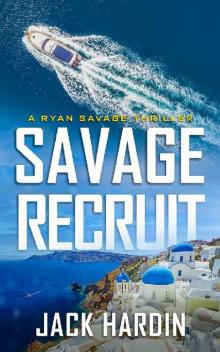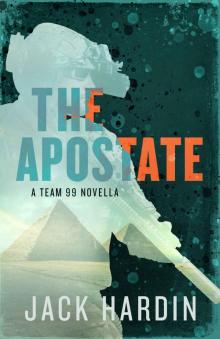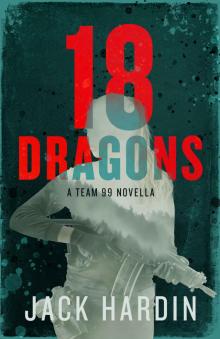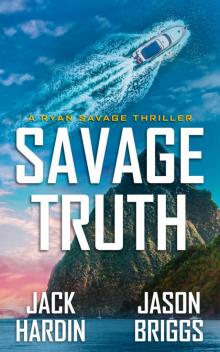- Home
- Jack Hardin
18 Dragons Page 3
18 Dragons Read online
Page 3
The Mercedes came to a stop, and they stepped out. Liu lifted her arms up and stretched as she breathed in the fresh air of the mountains, a welcome reprieve from the smog-choked atmosphere of Shanghai. She turned and took in the view. The pockets of mist hung between the contours of the foothills like wisps of cotton, and miles and miles of green mountains and hills stretched as far as the eye could see. Noticeably absent were any cell phone towers in the distance, or the bulbous top of a water tower tank, or the distant hum of an airplane engine. Out here, it was just them. It was peaceful and calm and had a way of easing your muscles and clearing a weary mind.
It was here that Xu had proposed to Song thirty-eight years ago. A year later, Liu was born. She had always known that she was one of the lucky ones. At the time, her father had been a junior officer in the People’s Liberation Army, working its Third Department as a counterintelligence operative. China’s one-child policy had just been enacted and, rather than aborting a daughter, Xu had given up his dream for a son to give his wife the daughter she had always wanted. Liu knew that her father had never regretted the decision. But she was also aware that somewhere, deep within him, he wished that he had a son to carry on his name.
Liu walked around to her father’s side of the SUV. He was standing quietly, looking over the rest of the small plot that moved further up the gentle slope of the hill. There was a terrace laden with thick blooms of wisteria, and a small fountain trickled into a garden pond stocked with orange and black speckled carp. Between the terrace and pond, rising against a thick backdrop of bamboo, was a red granite pillar a meter-and-a-half high. Several lines of engraved text were embossed in gold. Xu had commissioned the pillar as a memorial for his late wife.
When morning dawned, father and daughter would walk out to it, hand-in-hand, and pay their respects.
Chapter Six
The sun was beginning to set when Ellie and Virgil left TEAM 99’s compound and drove off the Army garrison. They drove from Brussels to Frankfurt, where they assumed their new identities and boarded a Lufthansa flight to China, arriving at Shanghai Pudong International Airport eleven hours later. They disembarked, and after passing through customs with no incident, Ellie grabbed their luggage at baggage claim while Virgil went the opposite way down the terminal and rented a black Nissan Sylphy under the name of one Simon Cowen. After taking possession of the keys, Virgil made his way to the parking terminal and found the Nissan in its marked spot. He pulled out of the garage and brought it curbside where Ellie was standing next to two hard shell photography cases and a large duffle bag. He got out and helped her load them into the back. Once they were in the car, Ellie set her backpack at her feet and removed two pairs of gloves. She donned a pair and handed the other to Virgil. He pulled away from the terminal, negotiating taxis, Didi Chuxings—China’s version of Uber, and passengers scurrying across the road towing luggage and corralling small children.
Virgil took the exit ramp out of the airport and merged onto Shenjiahu Expressway. Within minutes, they were crawling along, oozing through congested traffic that forced them to keep their speed under five miles-per-hour for the better part of the next two hours. The traffic began to clear as rush hour came to a close. They finally reached the outskirts of China’s largest city and continued a course toward the city of Hangzhou.
They didn’t speak; conversation during an operation was to be kept to a minimum. What little talk Virgil and Ellie did engage in was strictly related to their opinion of the scenery, which, as they continued their drive further into the rural areas of Zhejiang Province, Ellie regarded as breathtaking. Before them, the Jinggang Mountains rose high out of the earth, a vibrant green carpet of trees, swooping up into the sky and curving back toward the earth in a tapered descent like the backs of dinosaurs. A heavy fog accompanied the encroaching darkness as they continued their drive southwest and further into the country’s interior.
Mortimer had been right. The exfiltration plan was not ideal. Being this far inside the bowels of the country meant that they had to rely on several steps—and additional assets—to get them out. Should they be intercepted, should they be arrested and questioned by the authorities, their false identities would not hold up. Especially not once they had fulfilled their mission, once their target was dead. Once word of the assassination got out, once the authorities were alerted, all foreigners traveling anywhere in the region would be detained. Ellie and Virgil would have to put their lives into the hands of someone who was not on their small team, someone they did not personally know. As a result, they were both anxious to get the mission completed and behind them.
They drove on, passing through the city of Hangzhou and over the Qiantang River before they finally caught a glimpse of the lights of Fuyang twinkling through the mist in the valley far below. With each mile they put behind them, Ellie could feel a solemn weight press down on her. She knew that Virgil felt it too. They all did, for that matter, whenever a mission like this was handed down. They were expert assassins. But they had not yet become machines. Ellie never allowed herself to become emotionally involved in the mission. She couldn’t. The mission demanded a singular commitment, regardless of how you felt about it. But that didn’t mean that taking another life suddenly became trivial. Tonight, they were driving through a scattered chain of smaller cities. Tomorrow, they would leave the country with a body behind them. Such realities never did stop poking around on the fringes of the conscience.
They continued on, riding past expansive tea and rice fields as they passed through Fuyang, Changkouzhen, and Jiangnanzhen before arriving in Tonglu, located on the banks of the Fuchin River in the center of Zhejiang Province. The city was home to half a million inhabitants, whose lives had been recently enriched by upgraded manufacturing plants that provided jobs paying larger sums of money than the locals had ever previously known.
Virgil drove through the city, putting white and gray skyscrapers behind them before finally turning onto Yinchung Road and taking it to the outskirts of the city. In the distance, the white and yellow glow of the city gave way to a curtain of darkness that their eyesight could not penetrate. It was the Daqi Mountains, protected by strict regulations against development and urban expansion. The mountain range and its precipitous hills extended thirty miles into the distance, absent of any cities and only a few ancient and scattered towns that were no larger than a few hundred inhabitants.
It was just after ten in the evening when they arrived at the motel. Virgil slowed the car and turned into a parking lot beneath a yellow backlit sign advertising the name of the establishment. Neither operative could read Mandarin, but they had been told to look for a metal statue in the form of a large orange crane. It was hard to miss. It stood twenty feet tall and both its wings were outstretched, the span of which was double its height. Ostentatious, to say the least. The motel was average and at first glance trended toward run-down. It reminded Ellie of a neglected Motel 6 back in the United States: there were two floors, the doors to the rooms faced the street, and from behind drawn curtains came the flickering blue and white glow of televisions on the other side. A metal railing ran the length of the top balcony. The only thing out of the ordinary was the giant crane that looked like it had escaped from a prehistoric zoo and had landed in the wrong spot and era.
Virgil parked in an open spot near the entrance where, a few doors down, a man was standing outside his room puffing on a cigarette. He eyed the Westerners with a vague interest before flicking what was left of his cigarette onto the pavement and returning to his room.
As soon as his door was shut, Ellie reached into the backpack and withdrew a microfiber cloth. She handed it to Virgil, and he used it to wipe down any prints he might have left behind before he put on his gloves. When he was finished, he released the trunk latch and got out, removed his gloves, and then walked over to the office and went inside. Ellie watched through the window as Virgil approached the counter and spoke with the attendant, an elderly lady that squinted at him thro
ugh thick coke-bottle glasses. He handed her the required cash, signed a paper she slid in front of him, and after receiving the room key, he returned to the car. Ellie grabbed the backpack and took it with her as she got out and walked to the rear of the vehicle. She lifted out two cases. Virgil took the duffle bag, shut the trunk, and they walked down the walkway past several doors before arriving at room 109, the room at the farthest end of the building, nearest to the street. He unlocked the door and held it open for Ellie before entering after her.
They moved efficiently. Ellie flipped the latches on one of the camera cases and opened the lid. She removed a Sony A7III camera and the accompanying Zeiss Batis 85mm lens. She slipped each item into its own felt-lined canvas bag and put both of them in the backpack.
Virgil did the same with his camera case, withdrawing a Canon EOS R and a Canon 24-70mm lens. He shut the case and set it on the bed. Next, he unzipped the duffle bag and removed several items of forest green clothing. He tossed Ellie her bundle. They changed quickly, shedding their jeans and shirts and donning waterproof cargo pants, hiking boots, and thermal long-sleeve shirts that would help to mitigate against the chill of the evening mountain air. Then they shrugged into polyester softshell jackets and draped waterproof ponchos over their shoulders.
Finally, they wiped down the cases one last time and shouldered their backpacks. Virgil left the keys to the car and the empty luggage on the bed. They would not be coming back here. Another unknown asset would retrieve what they left inside the room and the car out front.
They looked soberly at each other, both ready for the task in front of them. Virgil stepped up to Ellie and gave her a firm, brotherly hug. It was one of the things that endeared him to everyone on his team. He did it each time before stepping into the field; it didn’t matter who was with him. It was his silent way of saying good luck, that he had your back, and let’s go get the job done.
Ellie returned the gesture, and with a final clap on the back, Virgil released her, gave her a wink, and headed for the door. She followed him out.
The warm air was cooling quickly as a storm drifted onto the mainland from the East China Sea two hundred miles to the east. Their pre-op intelligence had informed them, with a high degree of confidence, that the storm would end well before morning. In the event that it did not, the operation was to be called off and the target granted another few weeks or months of life before another operation could be planned. As it was, their window was small. Their target hardly ever left the city. Intelligence did not know when they would have another chance. Either way, they had a long, wet night ahead.
They turned away from the building and into the shadows behind it. The motel sat on the edge of Daquishan National Forest Park, and the American operatives quickly drifted into the tree line and disappeared altogether.
Chapter Seven
Chen Woo stood in the recessed shadows of the small garden pavilion and looked up into the night sky, where here, away from the city, thousands of stars cast their light upon the earth. The air was cool here in the mountains, not cold this time of year.
The quiet stillness of the outdoors made him miss the military. He missed sleeping on the ground, training in the dirt, navigating uneven and unfamiliar terrain. But the money was in private security. And after sixteen years with the People’s Liberation Army, six of them with its Special Operations Forces, he left the military behind him and was hired on as the chief of Xu’s security detail. It was a job he took with all the gravity it demanded. Heading up the security detail for one of China’s richest and certainly one of its most powerful men was no light matter.
Even now, being half a dozen miles from the nearest town and twenty miles from the closest city, his team was alert—their eyes sharp, their ears attentive. Over the last week, they had refreshed their familiarity with the local terrain, studying maps and looking at pictures. Their employer’s firm commitment to Communism was known by all, hidden from no one. This made him a target for radicals and ideologues who had drunk too deeply of the capitalistic poison offered by the West. Xu was a great threat to these misguided individualists because he spent a great deal of money to spread propaganda of the old ways. He commissioned biographies on the Great Leader, Mao Tse Tung, and sponsored parades to honor his legacy; he was a strong supporter of the Chinese apparatus that maintained strict control over the Internet, even purchasing companies that lent censorship technology to the State. These actions brought him great respect among those who ran Zhongnanhai, the central headquarters for the Communist Party of China, but a disdainful eye was cast on him by those who saw him as impeding capitalist progress and true democracy.
Chen knew quite well that there was almost certainly no chance that an attack on Xu’s life would be attempted here in the mountains. Additionally, Xu’s schedule was kept under tight guard. The risks were higher as they moved about in the city, as they drove down the freeway or sat idle at a stoplight, or when Xu was speaking to a group, as before, or when he was at home in bed. Nevertheless, the work demanded that the security team go about their work under the perpetual assumption of an imminent threat. Other than the cook—a small ancient of a lady from Tonglu—and the four additional men on Chen’s security detail, the only two souls for miles were Xu and Liu. A quiet shuffle came from behind Chen. He turned and saw a shadowed silhouette standing in the entrance. He smiled as he walked toward it.
“Is your father asleep?” he whispered.
“Yes. He shut his light off ten minutes ago,” Liu said. She reached a hand up and set the flat of her hand against the side of his cheek. “You would think I was a silly teenage girl sneaking around like this. I missed you today.”
He leaned down and allowed his lips to hover over hers. Then he kissed her deeply. She returned the kiss, and when she finally drew back, her heart was racing and her neck hot.
Chen stroked her hair. “When will you tell him?” he asked.
“On the airplane back to Shanghai. Tomorrow morning is about my mother, not you and me. I do not want us to overshadow my mother’s memory.”
“Are you sure I should not speak to him before you do? It seems the right thing to do.”
“No.” Her tone was decisive. “We’ve discussed this. If he doesn’t hear it from me first, he will feel betrayed. He won’t understand why I did not speak to him of our relationship. He sees you as his head of security, not someone I am madly in love with.” She rose up on her toes and kissed him again. He rested his hands on her hips and drew her to him. When they finally broke away, Chen took her by the hand and led her to a bench. Wisteria hovered above their heads and filled the space with its scent.
“Your father,” Chen said, “has asked for me to add another team to his security detail. Has he told you this?”
She frowned. “No, he has not. Why would he do that?”
“I have received word that he may be the target of a planned attack.”
“What?”
“It’s fine,” he said. “Mostly they are rumors. But we don’t want to take any chances. He has asked that I bring the new team out here so he can speak with them himself in private, away from everyone else.”
She looked away into the darkness. Her father was a great leader on his own terms. He knew how to endear people to him. If he was bringing on an additional security detail, then it was no surprise that he was bringing them out here. When he hired Chen and his team, he had invited the four of them to his Shanghai estate for a drink, spending half an hour getting to know them personally. He asked them questions about themselves—their interests, their families, and their backgrounds. If her father requested Chen to bring the additional security team out here, it was because he wanted them to endear himself to them as well. “He loves this country,” she finally said, and then added, “His commitment to the old ideals is commendable.”
“And you?” Chen asked. “What do you love?”
She swung her face back to him. She leaned in and placed her head on his shoulder. “You, Chen
Woo. I love you.” She stood up. “I will see you in the morning. And I will tell father that I am deeply in love with you on the airplane tomorrow.” She looked around, the darkness wrapping them, dark clouds blocking out any light from the quarter moon. “Make sure to protect father from all the bad people out here who wish to harm him.”
He chuckled. “There is always a threat—wherever we are. That’s how we must operate. You know this.”
“Goodnight, my father’s protector.”
“Goodnight, my Liu.” She stepped from the pavilion and quietly made her way back down the path that led to the cottage.
Chen remained in the darkness, keeping watch.
Chapter Eight
At the same time Liu was giving Chen a final goodnight kiss and returning to the cottage, Virgil and Ellie were an hour into their hike. Laurels, pines, and tung oil trees grew close together, and it made the going slow. The forest floor was coated with pine needles and tall, luscious ferns, the tips of their leaves tall enough to drift into the operatives’ faces. Soon after they entered the woods, they located a dirt path and followed it for several kilometers through Daqishan National Forest Park until it terminated at the base of a granite cliff.
They had a map of the terrain, should they need it. But it was marked with neither their first nor second destination. The map was only to help them identify where they were in the unlikely event that they became disoriented. Should they be stopped by park authorities, the cameras would serve to buttress their identities as photographers. The unmarked map would belie their true destination.

 Savage Recruit (Ryan Savage Thriller Series Book 8)
Savage Recruit (Ryan Savage Thriller Series Book 8) Bitter Tide
Bitter Tide Vacant Shore
Vacant Shore Breakwater
Breakwater The Apostate
The Apostate 18 Dragons
18 Dragons Lonely Coast
Lonely Coast Savage Truth
Savage Truth Broken Stern_An Ellie O'Conner Novel
Broken Stern_An Ellie O'Conner Novel Broken Stern: An Ellie O'Conner Novel (Pine Island Coast Florida Suspense Series) Book 1
Broken Stern: An Ellie O'Conner Novel (Pine Island Coast Florida Suspense Series) Book 1